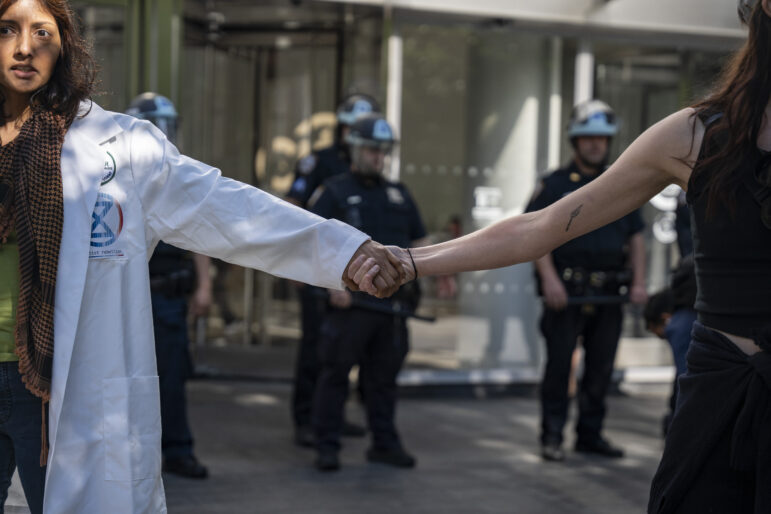“For years, Citi has refused to confront the issue of its fossil fuel business. And so, we are there, outside the bank’s headquarters, blocking the doors, being led away in handcuffs in the desperate hope that our acts may trigger Citi’s leadership to finally start treating global heating like the existential threat it is.”

Stop the Money Pipeline
Protestors and police outside Citibank’s Manhattan offices in June.Since June 10, the NYPD has made more than 330 arrests of climate defenders outside Citigroup’s global headquarters in Tribeca. The protests, which are calling for Citi to end its financing of coal, oil, and gas companies, are a part of the Summer of Heat on Wall Street campaign, an effort that I’m helping to lead.
In response, Citibank management has accused us of targeting Citi because it’s already a “leader in the energy transition.” That couldn’t be further from the truth. Here’s why hundreds of people are braving the heat to get arrested at Citi’s headquarters.
In 2021, the International Energy Agency (IEA) put out the most comprehensive study ever done to outline a global roadmap that would give us a fighting chance of achieving the global climate goals laid out in the Paris Climate Agreement. One of the IEAs key findings? To have a 50 percent chance of curtailing some of the worst impacts of global heating, “there is no need for investment in new fossil fuel supply.”
In other words, if we want to prevent New York’s public housing complexes, hospitals and schools from frequently flooding, or the record-breaking heat getting even worse, or hurricanes and storm surges becoming more common, we need banks like Citi to stop financing new oil and gas development and double down on investing in clean, renewable energy.
In the past three years, however, Citibank has provided $60 billion to the companies most aggressively investing in new oil and gas development. Indeed, over the past decade, Citi has provided more financing to companies expanding fossil fuels than any other bank.
Of course, winding down investment in carbon-intensive fuels is only half of the climate battle. We also need to be investing huge sums on the buildout of renewable energy. Research by BloombergNEF shows that banks like Citi need to finance at least four times as much clean energy as fossil fuels by 2030, in order to achieve global climate goals. Yet last year, Citi’s ratio of clean energy to fossil fuels was a pathetic 0.58-to-1, meaning it financed nearly twice as much fossil fuels as clean energy, a worse ratio than Bank of America and JPMorgan Chase.
Citi doesn’t want you to know any of this, of course. That’s why it pours money into things like the Citibike bike share program. It wants to make sure that when you think of Citibank you think of bicycles, not global heating. The truth is though, Citi spends tens of billions more supporting the companies fueling climate change than it does on bicycles.
One common argument against disruptive campaigns like the Summer of Heat is that we should try other tactics. In a recent Bloomberg opinion piece, one author even suggested that we should try “working behind the scenes” with Citi, as if that wasn’t something we’ve been trying for years.
I have been campaigning on banks and fossil fuels since 2016. We have sent petitions, written reports, mailed letters, rallied customers, supported shareholder resolutions, and held countless meetings with the bank’s sustainability teams. None of it has worked: Citi’s business practices remain out of line with what is required to limit global heating.
This is the reason that we have turned to sustained nonviolent civil disobedience.
To be sure, civil disobedience isn’t a pleasant experience for anyone. It isn’t pleasant for those of us being handcuffed and bundled into police vans. It isn’t fun for the cops who are arresting us, and it isn’t pleasant for the Citi employees faced with throngs of protestors as they try to get to work, including those employees who assault and threaten us.
But those who are decrying our tactics and saying that we should try working with the company should remember that is, in fact, the whole purpose of civil disobedience.
As Dr. Martin Luther King famously wrote, the point of a civil disobedience campaign is negotiation. “Nonviolent direct action seeks to create such a crisis and establish such creative tension that a community that has consistently refused to negotiate is forced to confront the issue,” he wrote from his Birmingham jail cell.
For years, Citi has refused to confront the issue of its fossil fuel business. And so, we are there, outside the bank’s headquarters, blocking the doors, being led away in handcuffs in the desperate hope that our acts may trigger Citi’s leadership to finally start treating global heating like the existential threat it is.
If you’re anxious about climate change, you should join us.
Alec Connon is the coalition director of Stop the Money Pipeline, a network of 200-plus organizations working to end financing for fossil fuels.








